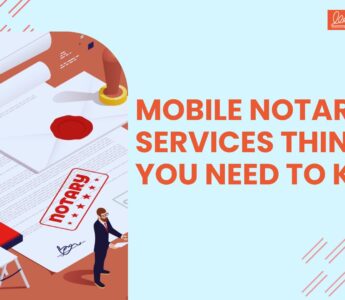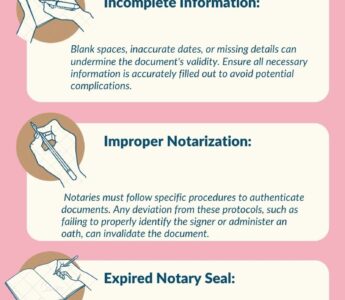Which estate planning documents need notarization?
Make sure that your documents will be upheld in court when you prepare or update crucial estate paperwork. Having them notarized is one way to do this. While certain estate documents need to be notarized when they are signed, others do not. We’re going to go through what a notary public actually does and which […]
June 12, 2023
Make sure that your documents will be upheld in court when you prepare or update crucial estate paperwork. Having them notarized is one way to do this. While certain estate documents need to be notarized when they are signed, others do not. We’re going to go through what a notary public actually does and which estate documents you should have notarized.

The Function of a Notary Public
An official who serves the community is a notary public. According to the legislation, notaries are only allowed to undertake a few extremely specified tasks, such as administering oaths, witnessing papers, and other administrative duties.
There is an application and approval process for every notary public. To become a notary public in Tigard, you must meet the following requirements: 1) be at least 18 years old; 2) be a US citizen or legal resident; 3) legally reside in the county where you are applying; 4) have a working phone number; and 5) be able to read and write English.
After completing the application procedure successfully, a notary public has the power to:
- The taking of vows and affirmations
- Create certified copies of any original paperwork that isn’t public information.
- Please accept my thanks.
- Take affirmative or oath-based verifications.
- Affidavits of witnesses made under oath
- Signatures on written documents should be witnessed or attested.
To put it another way, they have the power to authenticate signers, watch over the process of signing a document, administer oaths, swear that the information included in a document is accurate, and permit the duplication of original papers.
Requirements for notaries
Verifying the signer’s identity and ensuring that the documents are complete are required for a notary to carry out their notarial function. The notary will ask the signer to provide identifying documentation (such as a driver’s licence or passport) in order to accomplish this. The signer(s) must complete the form in person, in front of the notary, as well. The notary will typically ask the signer to fill out the paperwork in blue ink, which makes it easier to tell the difference between an original and a photocopy. The notary will sign and stamp the paperwork after everything is done. Either an ink stamp or a perforation stamp may be used for the stamps, which are issued as part of the notary application process.
If a notary public believes that the transaction is unlawful or dishonest, they will not administer an oath or notarize a document. Additionally, they will ensure that the signer is not being pressured and that they are aware of the implications of the transaction.
Estate Planning Documents Notarized
A document that has been notarized has been correctly executed and should hold up in court. Notarization is not required for every estate document, but it might be a wise, proactive move if you’re worried that other parties won’t carry out your desires. If you need any guidance on notarizing wills or estate planning, you need to contact any nearby notary public. The following types of papers must be notarized:
- Custody and Guardianship Agreements
- Executorships
- Power of Attorney
- Probate Court Petitions
- Trusts
- Wills
Do you still have questions? Get in touch with Mr. Han Poonawala and Pdx signing
It takes time and effort to complete your estate documents. You want to ensure that your paperwork will hold up in court after all that labor. A notary public is crucial to that procedure. Please contact us at +971 708 3000 or via our online contact page if you have any questions about notarizing your estate documents or if you’d like to arrange an estate planning session.
FAQ
One important document needed for estate planning is a will, which outlines how a person's assets will be distributed after their death. Another important document is a durable power of attorney, which grants someone the authority to make financial and legal decisions on behalf of the individual in case they become incapacitated.
In order for estate documents to be regarded as legally binding in the state of Oregon, they must be notarized. In other words, if you are creating or revising your will. It won't be valid unless you take it to a notary public and have them witness it. Growing a valid will requires several steps, one of which is notarization.





